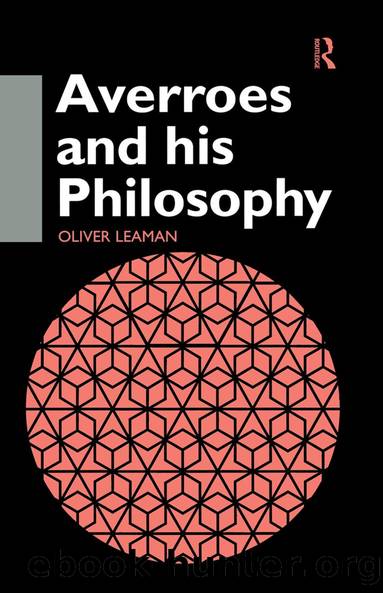Averroes and His Philosophy by Oliver Leaman

Author:Oliver Leaman [Leaman, Oliver]
Language: eng
Format: epub
Tags: Social Science, Ethnic Studies, General, Regional Studies
ISBN: 9781136803451
Google: 9kddAgAAQBAJ
Publisher: Routledge
Published: 2013-12-16T05:54:59+00:00
Essence and existence
It is important to emphasize that Averroes does more in his TahÄfut al-tahÄfut than defend Peripatetic philosophy from the ravages of Ghazali. Ghazaliâs critique is levelled at Avicenna, and Averroes does not intend to defend Avicenna at all times. On the contrary, Averroes seeks to establish a form of Aristotelianism which is secure against both the assaults of Ghazali and the elaboration of Avicenna. The nature of the distinction between essence and existence is a good example of the way in which Averroes attempted and succeeded in interpreting the two Persian philosophers as representing a common position despite their apparent differences. There has been a good deal of controversy in the literature as to whether the discussion of the distinction between essence and existence in the philosophy of the Christian and Jewish communities after the death of Averroes was accurate. It will be argued here, and indeed throughout the book, that both Averroism and the reaction to it in the medieval and Renaissance world provided a broadly accurate reflection of the central issues in Averroesâ thought.
There are a large number of issues on which Averroes bitterly criticized Avicenna, and these are usually on points where Avicenna developed views on Aristotle which contradicted Averroesâ interpretation. Perhaps the most important of these issues is that of the relationship between essence and existence. Not only is this dispute interesting in itself, but it has been widely argued recently that Averroesâ critique of Avicenna is misguided, his arguments unsuccessful, and as a consequence the later medieval debate is founded on error.24 I want to argue here that this is not the case, that Averroes did understand his predecessorâs point of view and produced telling objections against it, and that the later debate in Christian Europe was accurately based upon an issue of real philosophical significance.
Let us take Averroesâ objections in order. Firstly, there is a terminological point. Avicennaâs key error is taken to be his thesis that existence is an accident. This is partly because of his interpretation of the Arabic term al-mawjÅ«d (literally âwhat is foundâ) for âexistenceâ. Avicenna is said not to realize that this term was used by the translators of Greek philosophy into Arabic to refer not to an accident of something, but to its essence (dhÄt) (TT 372). This term used to represent âexistenceâ can be used in (at least) two ways, either as meaning âthe trueâ and thus having a copulative function, or as meaning a âthingâ or âentityâ (TT 302). According to Avicenna, existence is an element excluded from the analysis of the nature of anything other than God. Existence is an aspect of the typewriter upon which I am working now, the typewriter as a substantiated object, but it is not part of the essence of the typewriter, of the typewriter qua typewriter. This is because the typewriter, like everything else other than God, is contingent and only possible in itself because necessary through another, and is dependent for its existence on a necessary being.
Download
This site does not store any files on its server. We only index and link to content provided by other sites. Please contact the content providers to delete copyright contents if any and email us, we'll remove relevant links or contents immediately.
| Anthropology | Archaeology |
| Philosophy | Politics & Government |
| Social Sciences | Sociology |
| Women's Studies |
Born to Run: by Christopher McDougall(7127)
The Leavers by Lisa Ko(6948)
iGen by Jean M. Twenge(5415)
Sapiens by Yuval Noah Harari(5370)
Spare by Prince Harry The Duke of Sussex(5196)
The Kite Runner by Khaled Hosseini(5178)
Machine Learning at Scale with H2O by Gregory Keys | David Whiting(4313)
Bullshit Jobs by David Graeber(4190)
Never by Ken Follett(3955)
Goodbye Paradise(3810)
Livewired by David Eagleman(3772)
Fairy Tale by Stephen King(3396)
A Dictionary of Sociology by Unknown(3085)
Harry Potter 4 - Harry Potter and The Goblet of Fire by J.K.Rowling(3073)
The Social Psychology of Inequality by Unknown(3029)
The Club by A.L. Brooks(2925)
Will by Will Smith(2919)
0041152001443424520 .pdf by Unknown(2845)
People of the Earth: An Introduction to World Prehistory by Dr. Brian Fagan & Nadia Durrani(2736)
